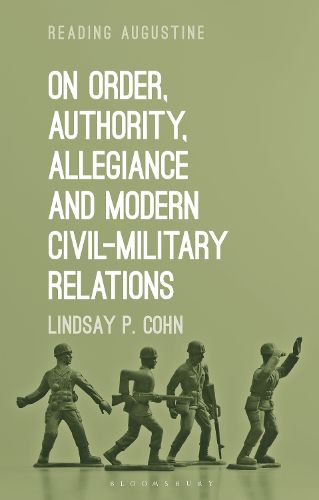Readings Newsletter
Become a Readings Member to make your shopping experience even easier.
Sign in or sign up for free!
You’re not far away from qualifying for FREE standard shipping within Australia
You’ve qualified for FREE standard shipping within Australia
The cart is loading…






Lindsay P. Cohn reads Augustine from the perspective of modern civil-military relations, analyzing how Augustine's views on order, authority, war, peace, violence, and public service help illuminate current debates about democratic control of the military, the ideal relationship between the soldier and the wider society, and the role of the military leader in policy and strategic planning.
While Augustine never wrote a treatise on war or military service, nor indeed on political theory of any kind, his ideas about these topics form part of a centuries-old theoretical and ethical tradition with great contemporary relevance.
Cohn explores the relevance of Augustine's thought to contemporary normative theories of civil-military relations, especially those of Huntington, Cohen, and Brooks. She then considers possible alternatives to Augustine's conservatism from the liberal, republican and other democratic theories of Locke, Rousseau, Habermas, and more. To engage with Augustine's ethical arguments about the appropriateness of political violence, Cohn draws from Clausewitz's descriptive arguments about the nature of war and how victory is achieved. Finally, Cohn looks at the modern empirical literature about the role of militaries in democratic breakdown, in an effort to sketch a military professional ethic appropriate to modern political values.
Ultimately, Cohn highlights Augustine's moral guidance is of both practical and ethical importance; however, his assumptions about the nature of war and political authority require modification if we are to produce a usefully refined normative theory of civil-military relations.
$9.00 standard shipping within Australia
FREE standard shipping within Australia for orders over $100.00
Express & International shipping calculated at checkout
Lindsay P. Cohn reads Augustine from the perspective of modern civil-military relations, analyzing how Augustine's views on order, authority, war, peace, violence, and public service help illuminate current debates about democratic control of the military, the ideal relationship between the soldier and the wider society, and the role of the military leader in policy and strategic planning.
While Augustine never wrote a treatise on war or military service, nor indeed on political theory of any kind, his ideas about these topics form part of a centuries-old theoretical and ethical tradition with great contemporary relevance.
Cohn explores the relevance of Augustine's thought to contemporary normative theories of civil-military relations, especially those of Huntington, Cohen, and Brooks. She then considers possible alternatives to Augustine's conservatism from the liberal, republican and other democratic theories of Locke, Rousseau, Habermas, and more. To engage with Augustine's ethical arguments about the appropriateness of political violence, Cohn draws from Clausewitz's descriptive arguments about the nature of war and how victory is achieved. Finally, Cohn looks at the modern empirical literature about the role of militaries in democratic breakdown, in an effort to sketch a military professional ethic appropriate to modern political values.
Ultimately, Cohn highlights Augustine's moral guidance is of both practical and ethical importance; however, his assumptions about the nature of war and political authority require modification if we are to produce a usefully refined normative theory of civil-military relations.